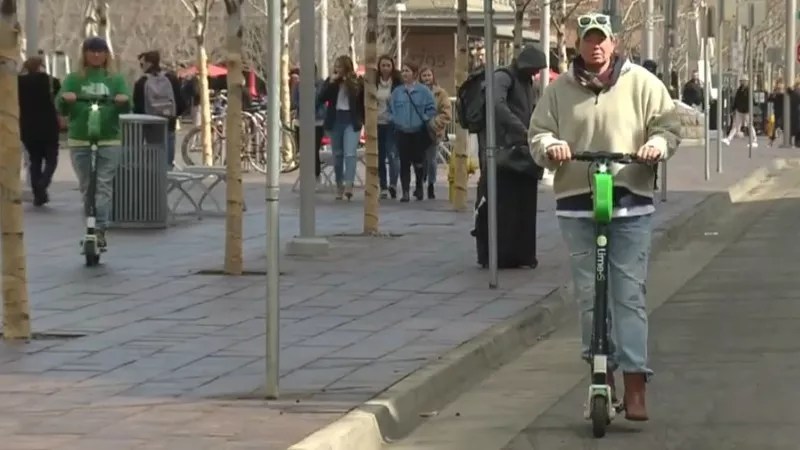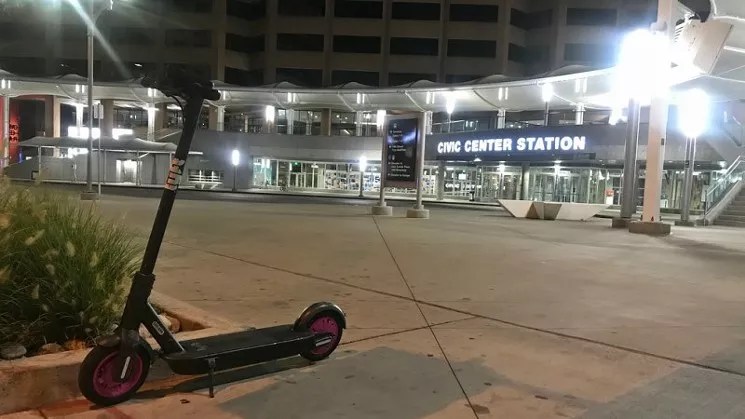
CBS4 via YouTube

Audio By Carbonatix
Two weeks ago, we shared the story of a woman who was knocked to the ground while strolling a Denver sidewalk by an electric scooter rider who reacted to her passionate complaints by telling her, “Write me a ticket, bitch” – and a subsequent phone call to police, who didn’t respond to the incident because she escaped injury, only added to her frustration.
On September 14, Jacob Campbell, 24, didn’t get away with negligent e-scooting, in large part because of the person he struck: a police officer. As documented in a probable-cause statement accessible below (and first reported by Denver7), he allegedly plowed into a cop directing traffic near Coors Field and was subsequently cited for driving under the influence, careless driving resulting in injury, and riding on the sidewalk.
Turns out, though, that Campbell wasn’t the first person charged with a DUI while piloting an e-scooter, or even the second. “This is probably the third or fourth one we’ve had for scooters,” says Lieutenant Rob Rock, the man in charge of the traffic investigations unit for the Denver Police Department. “It’s the same charge a bicyclist would receive for riding under the influence. The DUI laws apply to vehicles, not just motor vehicles, and during the last legislative session, scooters were designated as vehicles.”
The safe use of the gadgets has come under closer scrutiny following the death of Montana’s Cameron Hagan, who became the first Denver e-scooter casualty following an August accident in the Highland neighborhood. But ticketing for scooter or bicycle violations remains fairly rare, Rock acknowledges.
“Unless it’s an egregious violation, or if an officer sees somebody who’s operating a bicycle or a scooter in a very unsafe way – weaving around, swerving in and out of traffic – they’re not being stopped,” he says. “But if they’re involved in a collision and we detect that there’s impairment, that’s when they’re processed.”
He adds: “Generally, if there’s an injury, we’ll get involved. But if there’s no video or cell-phone photographs for the individual operating the device, it’s really difficult for us to do follow-up investigations. There are identifying numbers on the scooters – they’re on the area where you scan your phone to start it – and we’ve successfully conducted hit-and-run investigations on scooters. But we’ve also had some scooter crashes where folks who got hit didn’t want to file charges because the person tried to stop and stayed there afterward.”

The majority of scooter incidents reported to the Denver Police Department have come from downtown locations.
Photo by Michael Roberts
The DPD is collecting data on scooter offenses, and as of September 17, “we’ve had a little over 46 complaints that perhaps had some criminal nature to them, whether it was a crash and then the person took off or something like that,” Rock says. “But there’s no legal requirement for somebody who’s riding a scooter and crashes by themselves to report it to the police, so there’s a lot we don’t hear about. We’ve been called to some single-scooter crashes where the person has been so hurt that they couldn’t physically leave the scene without the help of an ambulance, and we try to get to the bottom of those. And we let the companies know if their scooter was involved in something like that. Sometimes we have no idea what precipitated the crash, but we’re trying to do more detailed investigations so that we recognize all the evidence that might be left behind after a scooter crash – skid marks or tire marks of any nature. We’re trying to get a better idea, because we think we’ll continue to see more of these as time goes along.”
Along the way, officers are cataloguing risky scooter habits.
“One of the things folks really need to understand about scooters is that they’re designed for only one person to operate it – and it’s illegal for more than one person to be on a single scooter at a time,” Rock stresses. “And we’ve also seen mothers with infants in baby carriers on their chest riding these things, and that’s extremely dangerous. The typical scooter crash is when the front tire hits something or gets locked up, or the handlebar gets caught on something and the person goes face first into the pavement. Those are the most horrific single-scooter crashes we’ve seen, and we don’t want any babies involved in something like that. We don’t want adults to be hurt, either, but babies….”
After three changes in the city’s scooter regulations in less than eighteen months, Rock says he’s relieved that things finally seem to have settled. “There was a lot of confusion over these devices initially, but now we have a clear direction from the state and the city, which really deserve credit for dealing with this problem, because there are a lot of cities around the country that haven’t created regulations around them,” he notes. “So we can tell folks that, for the most part, you can’t ride on the sidewalk anywhere in Denver. They should look at a scooter like a bicycle: You can’t operate it on a freeway or a highway, and they can’t ride it on a sidewalk, with very limited exceptions. So our message is, stay off the sidewalks. You should be on the right side of the road, and you have to signal your turns, which is something else that wasn’t originally part of the program with scooters.”
That doesn’t mean locals should expect a blizzard of citations for scooting on sidewalks, though. According to Rock, “We’re in the advisement and educational phase of our roll-out. We’re working with the scooter companies to push that information out through their apps, and working with our partners in Denver Public Works, who are putting together social-media messaging – and our officers will be handing out fliers to folks.”
Unless they get run over by an intoxicated rider, that is. Click to read the Jacob Campbell probable-cause statement.